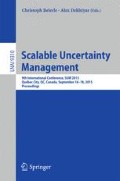Abstract
Many works have proposed architectures and models to incorporate explanation within agent’s design for various reasons (i.e. human-agent teamwork improvement, training in virtual environment [10], belief revision [8], etc.), with this novel architectures a problematic is emerged: how to communicate these explanations in a goal-directed and rule-governed dialogue system? In this paper we formalize Walton’s \(\mathtt CE\) dialectical system of explanatory dialogues in the framework of Prakken. We extend this formalization within the Extended \(\mathtt CE\) system by generalizing the protocol and incorporating a general account of dialectical shifts. More precisely, we show how a shift to any dialogue type can take place, as an example we describe a shift to argumentative dialogue with the goal of giving the explainee the possibility to challenge explainer’s explanations. In addition, we propose the use of commitment and understanding stores to avoid circular and inconsistent explanations and to judge the success of explanation. We show that the dialogue terminates, under specific conditions, in finite steps and the space complexity of the stores evolves polynomially in the size of the explanatory model.
Access this chapter
Tax calculation will be finalised at checkout
Purchases are for personal use only
Notes
- 1.
Throughout the paper we always use Greek letters \(\psi , \varphi , \phi \), etc. as metavariables for syntactically different well-formed formula (wff), and \(\varGamma \), \(\varGamma _0\),\(\ldots \) for sets of wffs.
- 2.
See [16] for a full description of the protocol.
References
Arioua, A., Tamani, N., Croitoru, M., Buche, P.: Query failure explanation in inconsistent knowledge bases using argumentation. In: Computational Models of Argument: Proceedings of COMMA 2014, vol. 266, p. 101 (2014)
Arioua, A., Tamani, N., Croitoru, M., Buche, P.: Query failure explanation in inconsistent knowledge bases: a dialogical approach. In: Bramer, M., Petridis, M. (eds.) Research and Development in Intelligent Systems XXXI, pp. 119–133. Springer, Heidelberg (2014)
Bisquert, P., Croitoru, M., de Saint Cyr-Bannay, F.D.: Towards a dual process cognitive model for argument evaluation. In: Beierle, C., Dekhtyar, A. (eds.) SUM 2015. LNAI, vol. 9310, pp. XX–YY. Springer, Heidelberg (2015)
Bodenstaff, L., Prakken, H., Vreeswijk, G.: On formalising dialogue systems for argumentation in the event calculus. In: Proceedings of the 11th International Workshop on Nonmonotonic Reasoning, pp. 374–382 (2006)
Cawsey, A.: Explanation and Interaction: The Computer Generation of Explanatory Dialogues. MIT Press, Cambridge (1992)
de Vries, E., Lund, K., Baker, M.: Computer-mediated epistemic dialogue: explanation and argumentation as vehicles for understanding scientific notions. J. Learn. Sci. 11(1), 63–103 (2002)
Dung, P.M.: On the acceptability of arguments and its fundamental role in nonmonotonic reasoning, logic programming and n-person games. Artif. Intell. 77(2), 321–357 (1995)
Falappa, M.A., Kern-Isberner, G., Simari, G.R.: Explanations, belief revision and defeasible reasoning. Artif. Intell. 141, 1–28 (2002)
Harbers, M., Bradshaw, J.M., Johnson, M., Feltovich, P., van den Bosch, K., Meyer, J.-J.: Explanation in human-agent teamwork. In: Cranefield, S., van Riemsdijk, M.B., Vázquez-Salceda, J., Noriega, P. (eds.) COIN 2011. LNCS, vol. 7254, pp. 21–37. Springer, Heidelberg (2012)
Harbers, M., van den Bosch, K., Meyer, J.-J.C.: A study into preferred explanations of virtual agent behavior. In: Ruttkay, Z., Kipp, M., Nijholt, A., Vilhjálmsson, H.H. (eds.) IVA 2009. LNCS, vol. 5773, pp. 132–145. Springer, Heidelberg (2009)
Haynes, S.R., Cohen, M.A., Ritter, F.E.: Designs for explaining intelligent agents. Int. J. Hum.-Comput. Stud. 67(1), 90–110 (2009)
Khemlani, S., Johnson-Laird, P.N.: Cognitive changes from explanations. J. Cogn. Psychol. 25(2), 139–146 (2013)
Moore, J.D.: Participating in Explanatory Dialogues: Interpreting and Responding to Questions in Context. MIT Press, Cambridge (1995)
Moulin, B., Irandoust, H., Bélanger, M., Desbordes, G.: Explanation and argumentation capabilities: towards the creation of more persuasive agents. Artif. Int. Rev. 17(3), 169–222 (2002)
Pitt, J.C.: Theories of Explanation. Oxford University Press, New York (1988)
Prakken, H.: Coherence and flexibility in dialogue games for argumentation. J. Log. Comput. 15(6), 1009–1040 (2005)
Tamani, N., Mosse, P., Croitoru, M., Buche, P., Guillard, V., Guillaume, C., Gontard, N.: An argumentation system for eco-efficient packaging material selection. Comput. Electron. Agric. 113, 174–192 (2015)
Thomopoulos, R., Croitoru, M., Tamani, N.: Decision support for agri-food chains: a reverse engineering argumentation-based approach. Ecol. Inform. 26, 182–191 (2015)
Walton, D.: Dialogical models of explanation. In: Proceedings of the AAAI Workshop on Explanation-Aware Computing (ExaCt 2007), vol. 2007, pp. 1–9 (2007)
Walton, D.: A dialogue system specification for explanation. Synthese 182(3), 349–374 (2011)
Walton, D., Krabbe, E.: Commitment in Dialogue: Basic Concepts of Interpersonal Reasoning. SUNY Press, Albany (1995)
Acknowledgment
Financial support from the French National Research Agency (ANR) for the project DUR-DUR (ANR-13-ALID-0002) is gratefully acknowledged. We are also grateful to Nouredine Tamani for his valuable comments on the paper.
Author information
Authors and Affiliations
Corresponding author
Editor information
Editors and Affiliations
Rights and permissions
Copyright information
© 2015 Springer International Publishing Switzerland
About this paper
Cite this paper
Arioua, A., Croitoru, M. (2015). Formalizing Explanatory Dialogues. In: Beierle, C., Dekhtyar, A. (eds) Scalable Uncertainty Management. SUM 2015. Lecture Notes in Computer Science(), vol 9310. Springer, Cham. https://doi.org/10.1007/978-3-319-23540-0_19
Download citation
DOI: https://doi.org/10.1007/978-3-319-23540-0_19
Published:
Publisher Name: Springer, Cham
Print ISBN: 978-3-319-23539-4
Online ISBN: 978-3-319-23540-0
eBook Packages: Computer ScienceComputer Science (R0)

